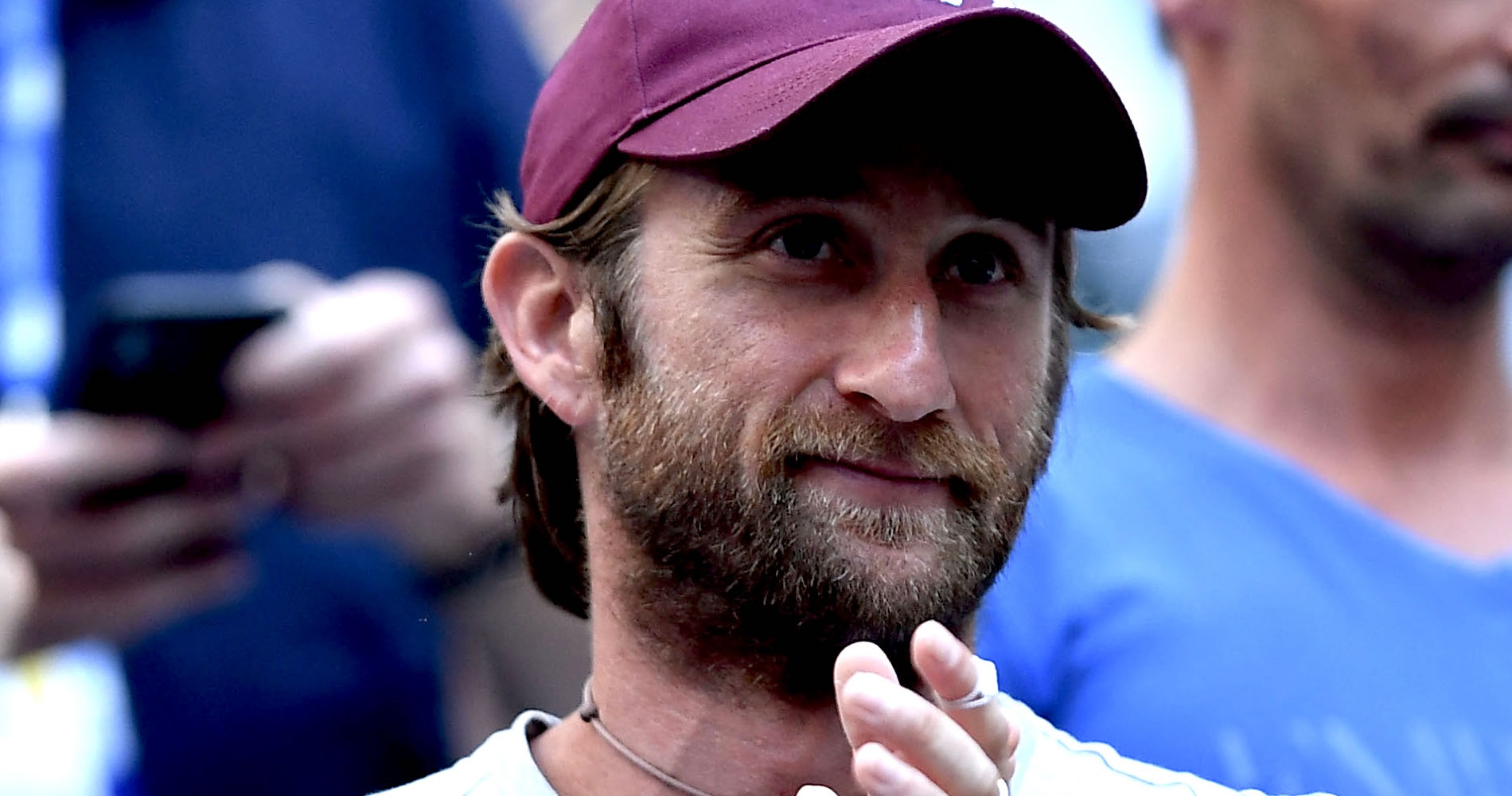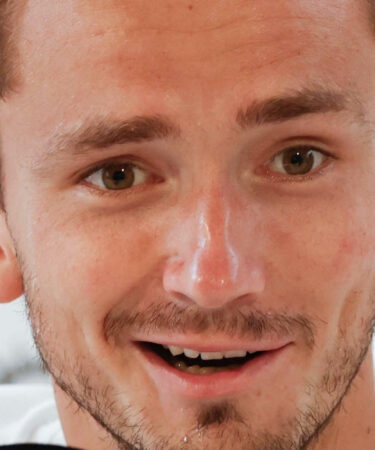How Daniil Medvedev harnessed his mental power to become one of the best players in the world
Equipped with a “monstrous mental potential” according to Francisca Dauzet, the psychoanalyst and performance coach who has been working with him since 2018, Daniil Medvedev has learned to control his impatience to reach the highest level.
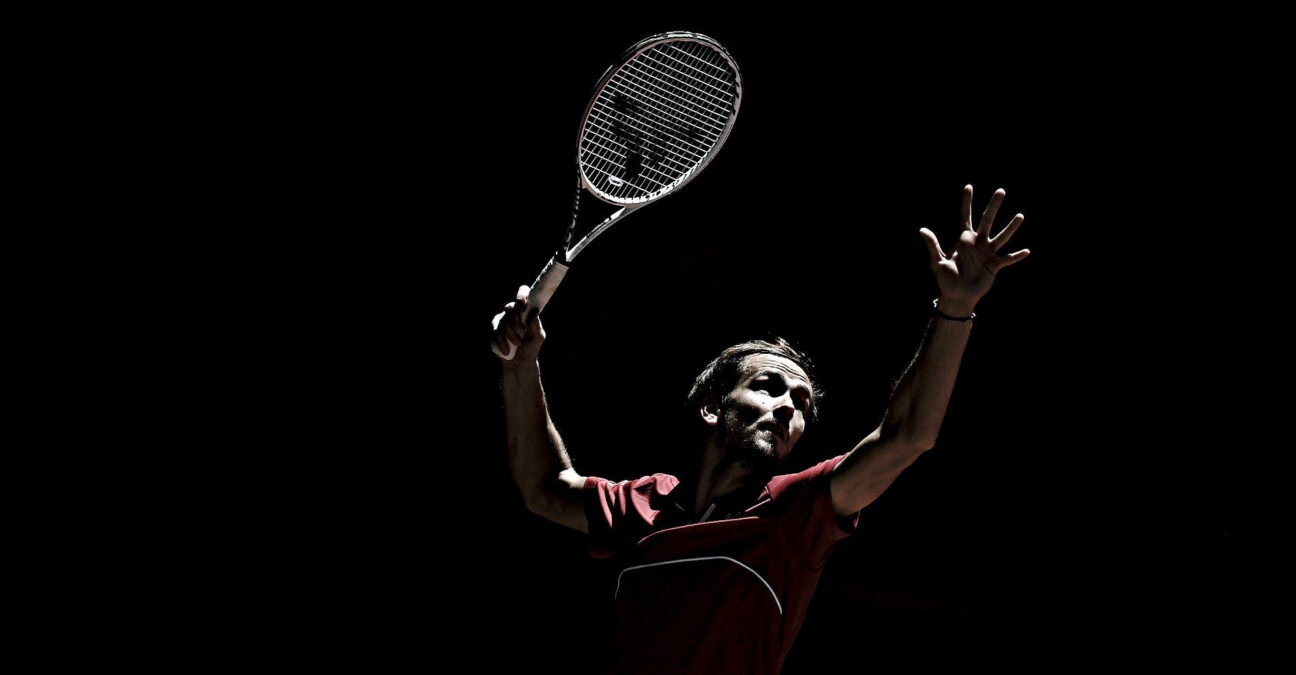 Daniil Medvedev, by Antoine Couvercelle / Panoramic
Daniil Medvedev, by Antoine Couvercelle / Panoramic
You may have heard Gilles Cervara, Daniil Medvedev’s coach, talk about the world No 2’s “genius” without fully understanding what this celestial word attached to great artists, sportsmen, or theorists might conceal. The puzzle is right there in front of our eyes: a player who asks the public to boo him before coming close to his first victory at the 2019 US Open, shots that come out of nowhere, such as a spinning backhand; temper tantrums that destroy his racquet or force his coach to leave the stands, a rare self-mockery for a sportsman at this level.
Medvedev has a big streak of eccentricity and mercurial talent. It’s part of his character. It contributes to making him the player best placed to challenge Novak Djokovic’s omnipotence in men’s tennis.
His genius, which we will translate as the exploitation of his deepest self in the pursuit of his sporting ambitions, is something Medvedev has been working on since Wimbledon 2018 with a French coach, Francisca Dauzet. By the way, the term “mental coach” does not satisfy Cervara, who was the one who put them in touch at the end of 2016.
“It’s such a vast field that I don’t feel qualified to talk about it,” Cervara told us. “We’re talking about all these things that are in our brains, that we can’t translate, that we can’t put into words if we’re not in front of a professional who will make the links between these different things and make the thoughts go where they need to go. Francisca is that professional.”
“To make the thoughts go where they need to go”: we doubt that Francisca Dauzet, who spent two hours with us in the shadow of Court Suzanne-Lenglen during the French Open, would use this formulation given by Cervara in the most natural and enthusiastic way. It may refer to the idea of thought control, which is probably neither ethical, nor necessary, nor even in Dauzet’s power for a high-level athlete. Tennis is a sport presumed to be very mental. But this fear of mental control leads coaches and parents – especially those of young women – to be reluctant when it comes to entrusting the inner psyche of an athlete to specialists in internal questioning.
He needs to work on all, which is logical because he is a human being.
Francisca Dauzet
Dauzet observes this issue with the perspective of someone who has worked in many fields. Dauzet’s scope with Medvedev is as vast as the human psyche. To understand her working method, we asked her: “Do you help Daniil to feel good and prevent him from suffering in his job, as Osaka recently described? Or to put it more eloquently, to not be scared at break point?” The answer is obvious: “He needs to work on all these things, which is logical because he is a human being.”
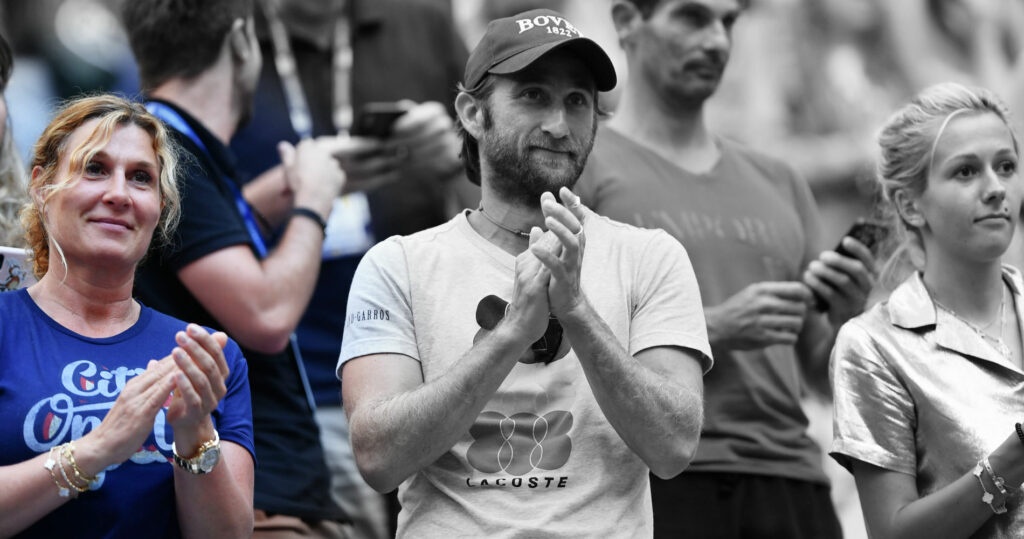
“Professional performance coach for high-level athletes”
“What interests me,” continues Dauzet, “is to understand what makes the person get there, what he is looking for. I have no drive on his behalf, I don’t judge his will, or absence of will, to perform. Even if I’m interested in what can be delivered, I’m not there to rush the person I am coaching into targeting the highest goals. I explore the entire field of his inner goals, I investigate in his own universe of what performance is, to see if there is an obstacle of any sort. Sometimes it’s very surprising to see what an athlete is looking for. I live at his pace, I synchronise with his energy completely.”
Dauzet also struggles with the words to describe her role. “I have the title of professional performance coach for high-level athletes, which is a label of the INSEP [France’s National Institute of Sport, Expertise, and Performance], so you can say that.”
Her skills are multidisciplinary. Her website – she has a consulting room in Paris in addition to her work with several “performers,” Medvedev being the most famous one – mentions in particular the skills of “therapist for high-level sports players”, “transgenerational psychoanalyst,” “Taoist Qi Qong therapist and Reiki Master”, “founder and president of the Institut de la Bientraitance (IdlB).” In her sessions, she “juggles” her different theoretical backgrounds and professional experiences. They have also led her to work with adolescents in difficulty in disadvantaged areas and Tennis Majors understands that the ATP Tour and the Grand Slam events are exceedingly reactive compared to this challenging area.
To tell the story of what brought her to the world’s greatest courts, Dauzet, now in her 40s, presents her professional evolution as the consequence of a deep personal trajectory. “I’ve always been interested in what a human being is, ever since I was little. When I was 17, I went to listen to Françoise Dolto’s lectures as a free listener. One day I went to talk to her and the end and I said: ‘Finally someone who thinks like me’. I immediately wanted to hide for having said this horror, I was nobody, but she answered me kindly: ‘Everyone must contribute to the building’.” Dolto, who died in 1988, was a recognised thought-leader in child psychology.
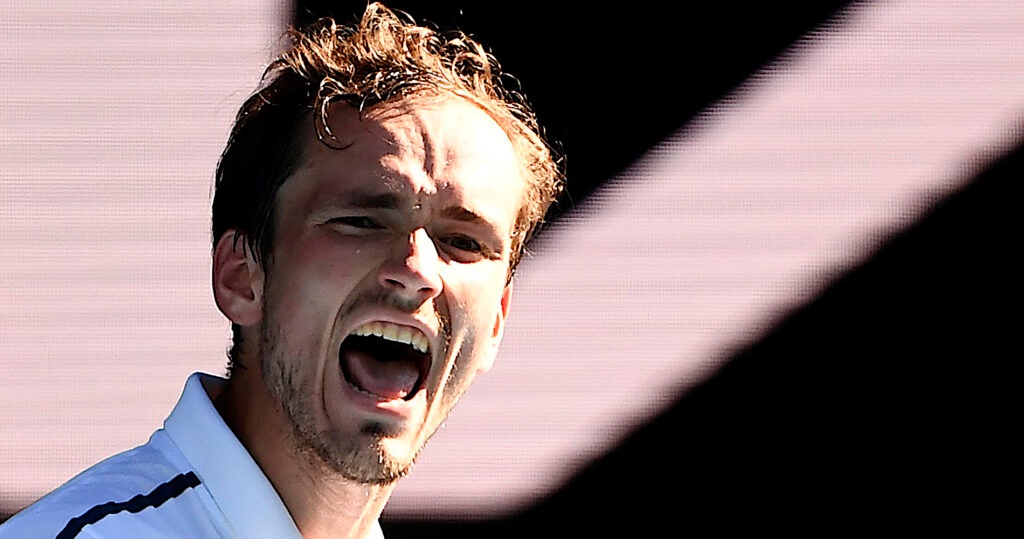
“Daniil is very fast, he really grasps it”
Dauzet had to overcome her family’s preconceived notion that only the intellectual world was worth investing in before she started working in sports psychology. But she loves sport, and when she realised the impact it had on the tennis teams (she played for in Bailly-Noisy or Louveciennes in the Paris region), ‘thanks to (her) knowledge of the human being’, she decided to train at the INSEP. Sport and high performance – she also advises company directors – are in line with one of her deepest convictions: “I think that human beings are performers, otherwise they would no longer exist as a species. Anthropologically, I’m interested in knowing how it works.”
Medvedev’s functioning – the famous “genius” evoked by Cervara — is fascinating raw material, she confirms. “When I talk to a person I’m helping, I receive different kind of information, from different sources. I’m a little like an ostheopath having ‘threads’ to understand injuries, I quickly juggle a lot of tools to understand the person I am working with. The more engaged the person in front of me is, the easier I juggle with them. That’s what can give quick results. And Daniil is very fast. When he takes what I suggest, when it speaks to him, and when he has the desire to achieve quickly, he really grasps it, he’s fast at catching things and the result is significant and powerful.
For a tennis player, there is, of course, the challenge of a tournament and a ranking. But there is also the deep unconscious stake: what does this thing represent in my history, in relation to my family, my country, my public image?
Francisca Dauzet
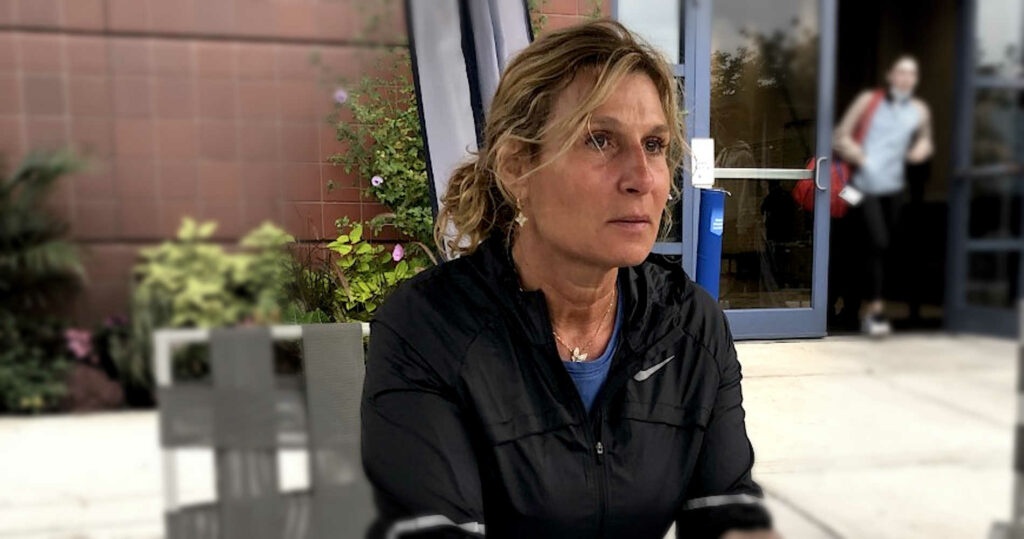
Tennis is unique in that the certainties of the previous week are challenged by the results of the following week. In addition to the mental exercises that Medvedev does as part of his process, just as he would do weight training at the request of his physical trainer, Dauzet sets, she says, “a sort of annual objective, on three dimensions.
“Firstly, there is the deep human dimension to ensure that the person comes to terms with himself as best as possible. Then, there is performance, the awareness of what this implies, and everything that the athlete will do to open up to performance. Finally, we work on pure mental processes, which we build together and which he applies more or less according to his needs on the court, where, in the end, he is alone.”
“For a tennis player, there is, of course, the challenge of a tournament and a ranking. But there is also the deep unconscious stake: what does this achievement represent in my history, in relation to my family, my country, my public image? Do I have the right to get it? Would success be a risk for me ? It’s a complex patchwork. Sportsmen have a short time frame to make themselves known because they can’t postpone their goals by 20 years. The higher the person goes, the more the person has worked on these subjects, the better the work will be.”
I had told Gilles that he had a monstrous mental potential.
Francisca Dauzet
That is how it is with Medvedev. Communicating in French, the intellectual ping-pongs between the two go as far as evoking philosophical concepts or detours to the etymology of Russian words from which Medvedev draws a particular feeling. The psychoanalyst remembers how she felt after her first sessions with the Russian player at the turn of the 2016 and 2017 seasons, when, as a 20-year-old, he was still playing the ATP Challengers. “I had told Gilles that he had a monstrous mental potential, that is to say a rare ability to explore his thoughts.” After this first contact, Medvedev reached his first ATP final in Chennai.
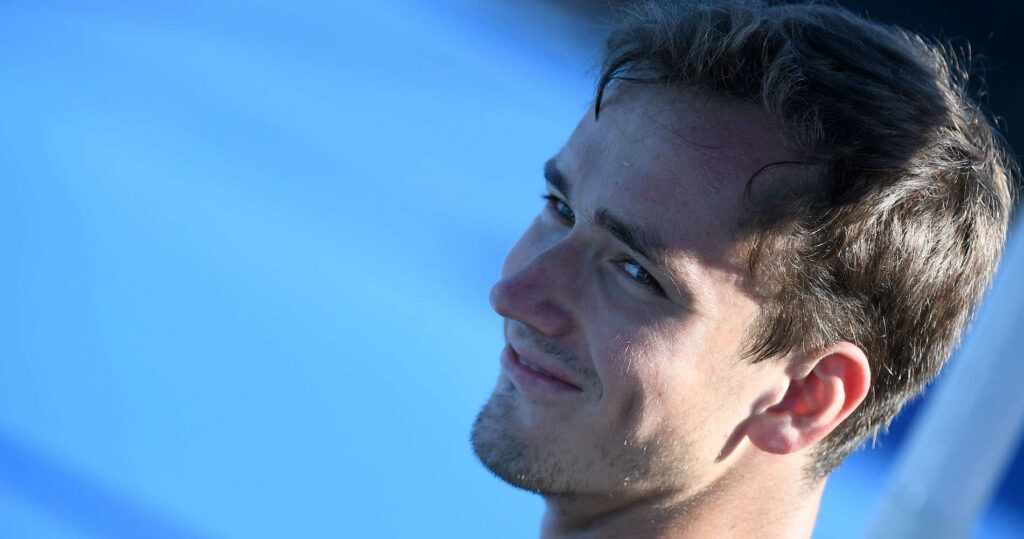
At this point, Cervara suggested that Medvedev meet Dauzet because the Russian was “unable to channel his outbursts”.
“There was a part of him that was not under control,” recalls the man who was not yet his full-time coach, but who was jointly responsible for his progress at the Elite Tennis Center in Cannes. “I had this trigger one day when, at the end of a training session, everything went wrong, it was really crazy on his side as well as mine. After a calm discussion, I told him that I thought this work was necessary.”
Accompanying a performer is a delicate operation because it means treating a problem, while leaving him the part that will make the performance possible.
Francisca Dauzet
Despite the final in Chennai, Medvedev’s results on the court did not follow up. He took his psychological advice elsewhere, and felt that Dauzet’s type of investigation would destabilise him. But Cervara still believed it would work. He had known her for 10 years through mutual friends. “I found myself in her approach, which is profound and complete, and which is not limited to a small part of the mind, as is too often the case, but which takes into account the whole complexity of the human being,” says Cervara. “As a person and as a coach, it spoke to me. Daniil is a complex, rich and deep person, and that’s why I thought she was the best for him.”
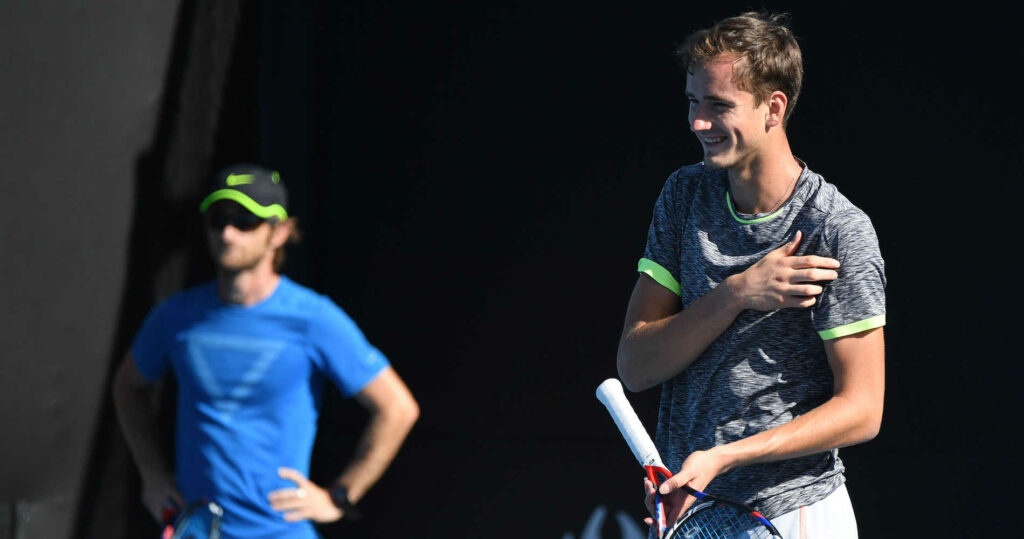
Cervara convinces Medvedev between Roland-Garros and Wimbledon 2018
“What characterises a performer,” adds Dauzet, “is that he is different, on the edge. They are neither more interesting nor more intelligent, they simply have an almost unlimited field of internal exploration. Working alongside a performer is a delicate operation because it means treating a problem, while leaving him the part that will make the performance possible. I can only be cautious, I have to search for creating order in a mess, because this mess is what creates the internal rules for the person I am coaching, and is the condition for permanent creativity. This requires a respectful acknowledgement of his internal system, even if it seems crazy, because that is where his genius lies. This is the case with Daniil.”
Daniil Medvedev was not exactly on top of the world when he accepted Gilles Cervara’s second proposal to include Dauzet in his staff. “After Roland-Garros 2018 (heavy defeat in the first round against Pouille, editor’s note), the season was going badly, I had the feeling that the work he was doing outside on the psychological level was not enough. I made him promise to let me know if he felt the same way I did.” In s’Hertogenbosch, a second-round loss to Verdasco had kept the grim mood alive.
I explained to him that I thought he needed to work with a professional who would lead him to discover what was going on inside him.
Gilles Cervara
“I joined him at Queen’s and I could see that something was wrong,” Cervara continued. “There were no soul in his expression. He’s taking 1 and 1 against Djoko in practice, not playing too badly, but you could see he couldn’t win more games, there’s something deep, impalpable missing.” In the tournament, he was dispatched in the second round by Chardy.
On the pool table at Queen’s, on the day France won their World Cup match against Argentina (4-3), the two men took the time to get to the heart of the matter. “I explained to him that I thought he needed to work with a professional who would lead him to discover what was going on inside him. He said: ‘OK, find me someone in Cannes’. I told him that I knew someone for that, but in Paris: Francisca. And when I told him that he didn’t like it, he cut me off and replied that he was ready to do it. Before, he didn’t feel mature enough.” It would be after Wimbledon that both men agreed.
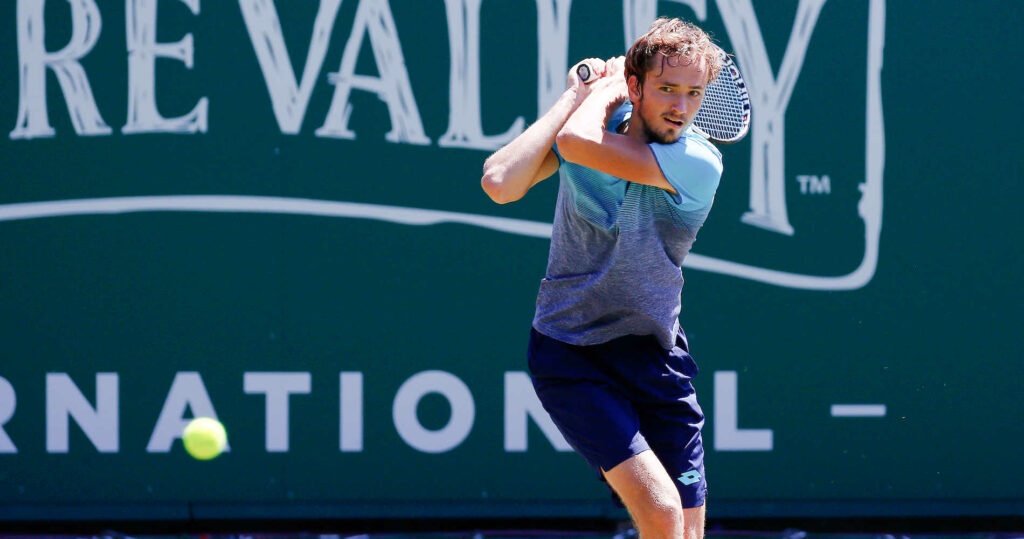
But a first-round rout of Steve Johnson at Eastbourne had given him a sense of urgency. “I was doing what I could with my tools,” says Cervara. “I remember trying to boost and rekindle that flame he no longer had by photocopying pictures of him with his eyes ablaze in Sydney, when he won his first ATP title (January 2018, ed. note). But you could feel a terrible loss of morale with every lost game, every point.”
“No magic, no dream, just work, work, work”
Francisca Dauzet finally arrived before Wimbledon. Just before. “And that had an immediate impact,” Cervara recalls. “Almost at once, it worked. I knew that making this move was important and it worked like a dream, even though I don’t like that expression… Yet Daniil draws Coric in the first round: it’s the worst (draw) for him. Coric was giving him trouble and he had just beaten Federer in the final in Halle.” Medvedev won 7-5, 6-2, 6-2 and reached the third round.
“A big result for us at that time. After that, he went on a crazy run. We were talking about going back to the Challengers, but in the end we went back to the Masters 1000 qualifiers.” Wins in Winston Salem and Tokyo put Medvedev in the top 20.
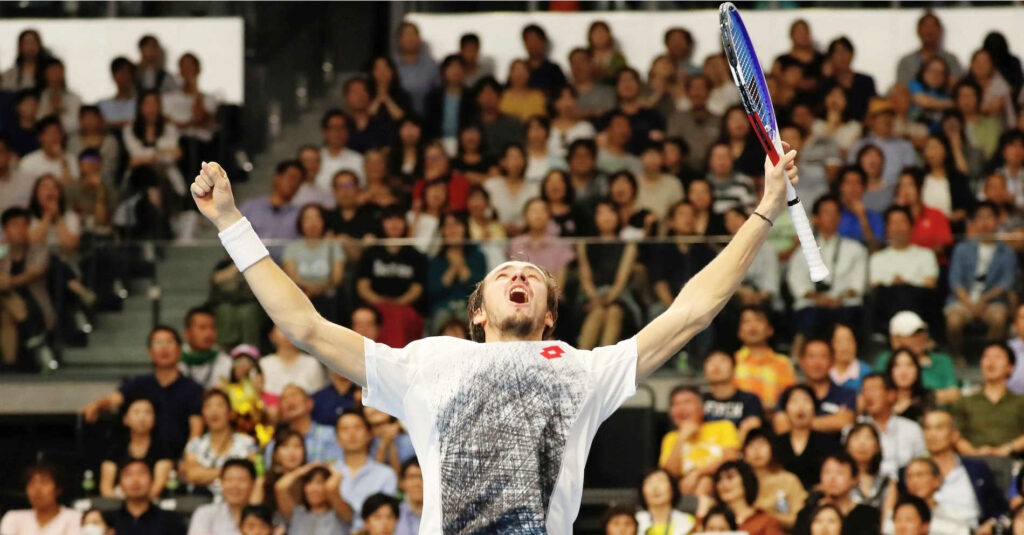
“There is no dream, no magic, but work, work, work,” posits Dauzet. She brushed aside the idea that her intervention was the trigger that led Medvedev to a drastic progression in the ranking :
– 68th place in the summer of 2018
– 16th at the end of the year
– Fifth at the end of 2019
– Fourth at the end of 2020
– Currently No 2
“That would be an abuse. Everyone is in their place in Gilles’ team, who is the performance project manager. The confidence that Daniil has in the work of all of us also comes from the results. He is very pragmatic, he walks the walk.”
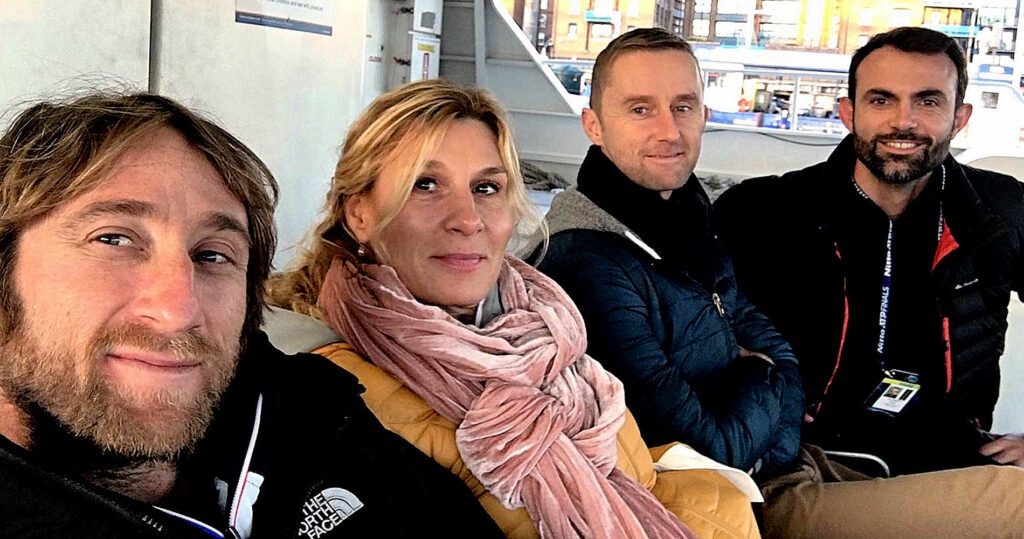
Dauzet also refutes that she anticipated her player’s trajectory, despite episodes that suggest the opposite. “Nobody would have bet a kopeck on him at the beginning. I was hearing, ‘Yes, but he Daniil not sharp enough, yes, but his technique is weird’, I said: ‘Yes it is, but he has something else and that something else can bring him to the top.’ I also said that to Daniil, and I think that got through to him, subconsciously.”
I was hearing, ‘Yes, but he Daniil not sharp enough, yes, but his technique is weird’, I said: ‘Yes it is, but he has something else and that something else can bring him to the top.’
Francisca Dauzet
“It was when I saw him win matches and tournaments that he didn’t seem ready for that I understood that potential,” says Cervara. “If I broke things down, I would say to myself, ‘Daniil is less strong than this player, he’s less strong than this one, and less strong than that one, yet he’s able to beat them.’ So there was something else that allowed him to put it all together beyond what it looked like. That’s what Francisca picked up in the mental register.”
2019 US Open, the result of anticipation
The psychotherapist is in the shadows of some key episodes in the Russian’s evolution. The booing and the events that made him somewhat of a cult figure at the 2019 US Open? “We anticipated it,” says Dauzet. “He wasn’t very popular. He was playing on small courts. He could get whistled at pretty quickly. We worked to make that a strength. He was playing in front of an American audience that likes winners, so maybe the audience finally thought it was great to react that way,” she smiles. In the final, Medvedev came close to defeating Rafael Nadal and received a standing ovation for his bravery.
But Dauzet agrees that she has “acclimatised Daniil to the delayed effect of the result”. “There can be resistance in a job. You work by accepting that it is difficult and perhaps long. When the person being coached refuses to jump, he is closed to breaking the resistance, he is at the heart of the core of the matter, ready for the next step. To say no is to get closer to the moment when you say yes.”
Saying no to clay, as Medvedev did for almost two seasons, only to open up to it… Medvedev’s quarter-final finish at this year’s French Open, after a disastrous clay-court campaign, would be the result of one of those delayed effects.
“At the UTS on the Tuesday before the French Open, he dropped the ball against Fritz, even though he refused to say so, and when I heared him say on the mic that he plays like shit on clay, I thought his self-defence system was still in place. But I thought that hopefully he was conscious of that, and possibly ready to tip over (into a new path consisting of removing his mental blocks on earth, editor’s note). It could have happened at the French Open or it could have waited another year. Finally, something great happened.”
Medvedev “just can’t stand losing” (Cervara)
In Paris, Medvedev praised the quality of the clay, the ball and the environment as the reason for his good run at Roland Garros, as seen by four great wins. “Players like to let people know that things come from them,” she smiled.
Francisca Dauzet accompanies Medvedev at Grand Slams – when health regulations allow for more than two staff. She is currently in New York with Cervara and Medvedev’s wife. “The face-to-face work has more strength.” In this respect, she is also in the front row to feel the link between Medvedev and his coach – a bond of trust that is extremely strong, sometimes punctuated by stormy exchanges that delight social networks, as in January at the Australian Open.
“This kind of argument may seem shocking from the outside, and it’s difficult to live with,” confirms Dauzet. “Daniil admits it. He also appreciates that Gilles knows how to deal with it, although I don’t know if he realises how hard it is, humanly speaking. But in Daniil’s system, his attitude is one of the things that helps him at that moment.”
When he explodes, it doesn’t take him away from victory, it’s because he’s hanging on, fighting and looking.
Gilles Cervara
“Daniil is someone who just can’t stand losing,” Cervara says, “and when he doesn’t win or lead, he looks for solutions where others might accept defeat or refuse to look for that extra energy. When he explodes, it doesn’t take him away from victory, it’s because he’s hanging on, fighting and looking. So I let it slide because I know that he is fighting. Besides, many coaches told Daniil, when he was with them, that he didn’t fight, that he accepted defeat. So it didn’t stick, because they didn’t understand him.”
In three seasons now, Medvedev has pushed his evident qualities to the absolute limits – he himself didn’t think he could reach the Top 30. “There are no limits, only those we set ourselves,” says Dauzet. “It is a leitmotif that we work on constantly. For that, Daniil has an incredible capacity that not all human beings have.” You might name that “genius”.
